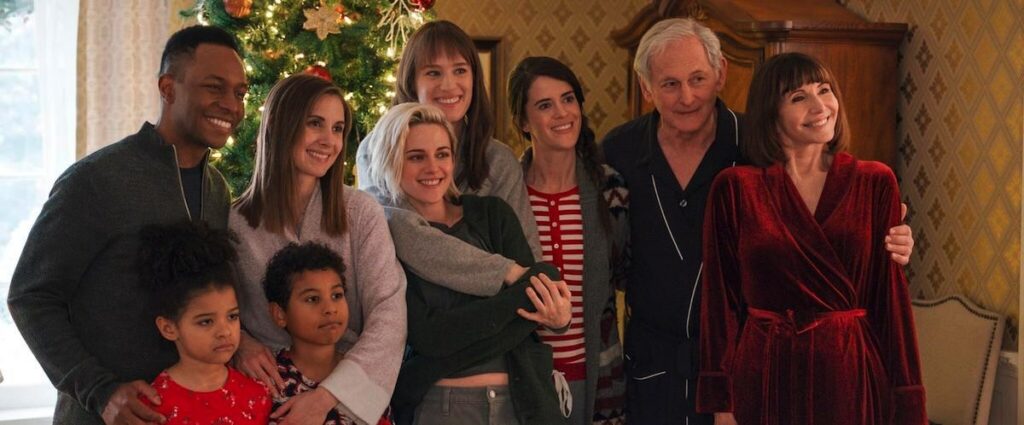Photo ©TriStar Pictures
I like to pride myself in saying that many movies don’t make me cry when really a lot of movies make me cry. Seriously. A few weeks ago, I almost teared up watching “Ratatouille”. And “Happiest Season”, Hulu’s newest holiday romantic comedy, definitely made me cry. This is your first warning for spoilers up ahead!
The film follows Abby (played by Kristen Stewart) planning to propose to her girlfriend Harper (Mackenzie Davis) on Christmas day. Abby, who lost her parents when she was nineteen and has lost the Christmas spirit, is excited to be celebrating the holiday with a family. At the same time, Harper is trepidatious about the holiday and bringing Abby with her.
Abby and Harper’s friend, John (Dan Levy), is at first skeptical, then supportive, of Abby to pop the question (including asking her father for his blessing) but supports Abby nonetheless. However, on the road to her family’s house, Harper tells Abby that she isn’t out as a lesbian to her family, even though she told Abby she came out to her family earlier. Harper tells her that she told her family that she’s bringing her straight, orphan roommate to spend Christmas with them, much to Abby’s dismay.
What follows are cute, but frequently tense situations where Abby and Harper try to hide their sexualities from Harper’s politician dad (Victor Garber) and perfectionist mother (Mary Steenburgen), as well as her sisters, uptight Sloane (Alison Brie) and quirky Jane (Mary Holland). In the days before Christmas, the couple’s days are filled with parties hosted by Harper’s family and Harper reconnecting with friends, all while pretending to be straight roommates. Awkwardness and comedy ensue when Abby meets Harper’s exes Connor (Jake McDorman) and Riley (Aubrey Plaza). Even though Harper’s family has welcomed Abby, she still feels like an outsider and not enough for them. Thankfully, the awkwardness isn’t enough to turn into cringe, but instead keeps the viewer glued to the screen to see what happens next.
Anyone can find these conflicts relatable, like feeling left out of your partner’s family (or even your extended family), running into your partner’s ex (or two in the same night, in the case of Abby), and even trying to hide who you are to people who might not accept you. These are challenging and genuine conflicts, and “Happiest Season” presents them in a realistic and well-done way. Abby’s feelings of loneliness while Harper helps her father or hangs out with high school friends definitely hits close to home.
After Sloane catches Abby and Harper about to kiss the night of their mother’s Christmas Eve party and goes on to out her in front of the entire party, Harper denies it, which breaks Abby’s heart and she goes to leave. Afterward, the three sisters confront their parents on the way they raised them. Not only do we see Abby’s conflict of wanting to fit in and be part of a family again, but we also see Harper and her sisters admit to their parents that they have been neglectful, judgemental, and made the three compete against each other for many years. While the whole exchange can be a bit intense, the audience is given space to breathe with a touching scene about coming out between John and Abby, the former of whom came to pick her up from the party. This scene, along with the ending of the film, were definitely when the waterworks came on.
Another thing I loved about “Happiest Season” was the characters. Stewart and Davis had great chemistry, both with each other and the ensemble. Levy and Plaza stand out both as their own characters with agency while also helping Abby figure out her feelings for Harper. Their characters also provide great comedic relief throughout, with Plaza especially bringing back the April Ludgate humor she’s so well known for. Personally, I loved Jane, Harper’s wacky sister, and her trying to explain her interests to others. I really felt for her when she was pushed off to the side, and I was so glad she stood up for herself when Harper destroyed her painting and her parents brushed her off.
Finally, something that really stood out to me was that this film was not made for the male gaze. There’s a joke running around the internet where there can’t be a lesbian-led movie without a) having it appeal to the male gaze, b) incredibly sad theme with an even sadder ending, or c) a historical drama (nothing wrong with historical dramas, but that just seems to be where lesbian-lead films seem to go). “Happiest Season”, however, doesn’t fall into any of these categories, although Slone outing Abby in front of everyone at their mom’s party could probably be distressing to many.
In the end, the parents accept Harper and her sexuality, Jane and her unique interests, and Sloane’s divorce, while also welcoming Abby to the family. Harper and Abby reconcile, with help from John. The film ends with the family taking the Christmas photo Harper’s mom had been wanting throughout the film, with Abby included. There’s also a sweet epilogue of Jane and her new book, Harper and Abby engaged, and the whole family happier and more accepting of their imperfectness (along with the family going to Pride and Harper’s father being elected mayor). While many of us aren’t able to be with family or loved ones over this holiday season, watching as the family comes together on Christmas can be a nice dose of holiday cheer.
Slowly but surely, stories about queer joy being told by queer voices are making their way to larger services. Our only hope is that we continue to provide more diverse voices in the film industry. In the meantime, grab some hot cocoa and watch “Happiest Season”. Just don’t forget the tissues.



